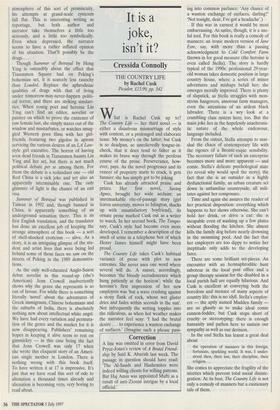It is a joke, isn't it?
Cressida Connolly
THE COUNTRY LIFE by Rachel Cusk Picador, £15.99, pp. 342
What is Rachel Cusk up to? The Country Life — her third novel — is either a disastrous mismarriage of style with content, or a prolonged and elaborate tease. My money's on the latter; but Cusk is so deadpan, so unrelievedly tongue-in- cheek, that it does tend to falter as it makes its brave way through the perilous course of the prose. Perseverance, how- ever, pays. As the novel progresses and its veneer of propriety starts to crack, it gets funnier: she has simply got to be joking.
Cusk has already attracted praise and prizes. Her first novel, Saving Agnes, brought her wide acclaim: an unremarkable rite-of-passage story (girl leaves university, moves to Islington, shacks up with unsatisfactory boyfriend), its ornate prose marked Cusk out as a writer to watch. In her second book, The Tempo- rary, Cusk's style had become even more developed. I remember a description of the smell of urine in a telephone box of which Henry James himself might have been proud.
The Country Life takes Cusk's habitual variance of prose with plot to new extremes. She never uses one word where several will do. A sunset, accordingly, becomes 'the bloody recrudescence which hung patiently at the horizon'; while the heroine's first impression of her new employers was 'but a wave crashing against a stony flank of rock, whose wet glister dries and fades within seconds in the sun'. Not infrequently the writing topples into the ridiculous, as when hot weather makes the narrator feel sexy: 'I had the brutal desire . . . to experience a wanton exchange of surfaces.' (Imagine such a phrase pass- mg into common parlance: 'Any chance of a wanton exchange of surfaces, darling?' `Not tonight, dear, I've got a headache'.) If this was in earnest it would be most embarrassing. As satire, though, it is a use- ful tool. For this book is really a comedy of manners: an ironic modern version of Jane Eyre, say, with more than a passing acknowledgment to Cold Comfort Farm thrown in for good measure (the heroine is even called Stella). The story is hardly typical of the 1990s: professional 29-year- old woman takes domestic position in large country house, where a series of minor adventures and mishaps befall her; she emerges morally improved. There is plenty of slapstick, as Stella struggles with mon- strous hangovers, amorous farm managers, even the attentions of an ardent black labrador. There is a wry look at a crumbling class system here, too. But the main joke lies in the hopelessly anachronis- tic nature of the whole endeavour, language included.
From the outset, Stella attempts to mar- shal the chaos of contemporary life with the rigours of a Brontd-esque sensibility. The necessary failure of such an enterprise becomes more and more apparent — and comic. Stella's delicate psychological state (to reveal why would spoil the story), the fact that she is an outsider in a highly dysfunctional family, an urban creature set down in unfamiliar countryside, all mili- tates against her composure.
Time and again she assures the reader of her practical disposition: everything which happens to her shows otherwise. She can't hold her drink, or drive a car: she is incapable even of washing up a few plates without flooding the kitchen. She almost kills the family dog before nearly drowning in the swimming pool. And the fact that her employers are too dippy to notice her ineptitude only adds to the developing farce.
There are some brilliant set-pieces. An encounter with an hermaphroditic hunt saboteur in the local post office and a group therapy session for the disabled in a local parish hall are equally hilarious. And Cusk is excellent at conveying both the boredom and menace of many aspects of country life: this is no idyll. Stella's employ- ers — the aptly named Madden family are so ghastly as to make ideal comic cannon-fodder, but Cusk stops short of cruelty or stereotyping: there is enough humanity and pathos here to sustain our sympathy as well as our derision.
In the end Stella has learnt a great deal about the operation of manners in this foreign, fortunate, sparkling world. It was, I under- stood then, their law, their discipline, their religion. ..
She comes to appreciate the fragility of the niceties which prevent total social disinte- gration. At its best, The Country Life is not only a comedy of manners but a cautionary tale of them.


























































 Previous page
Previous page